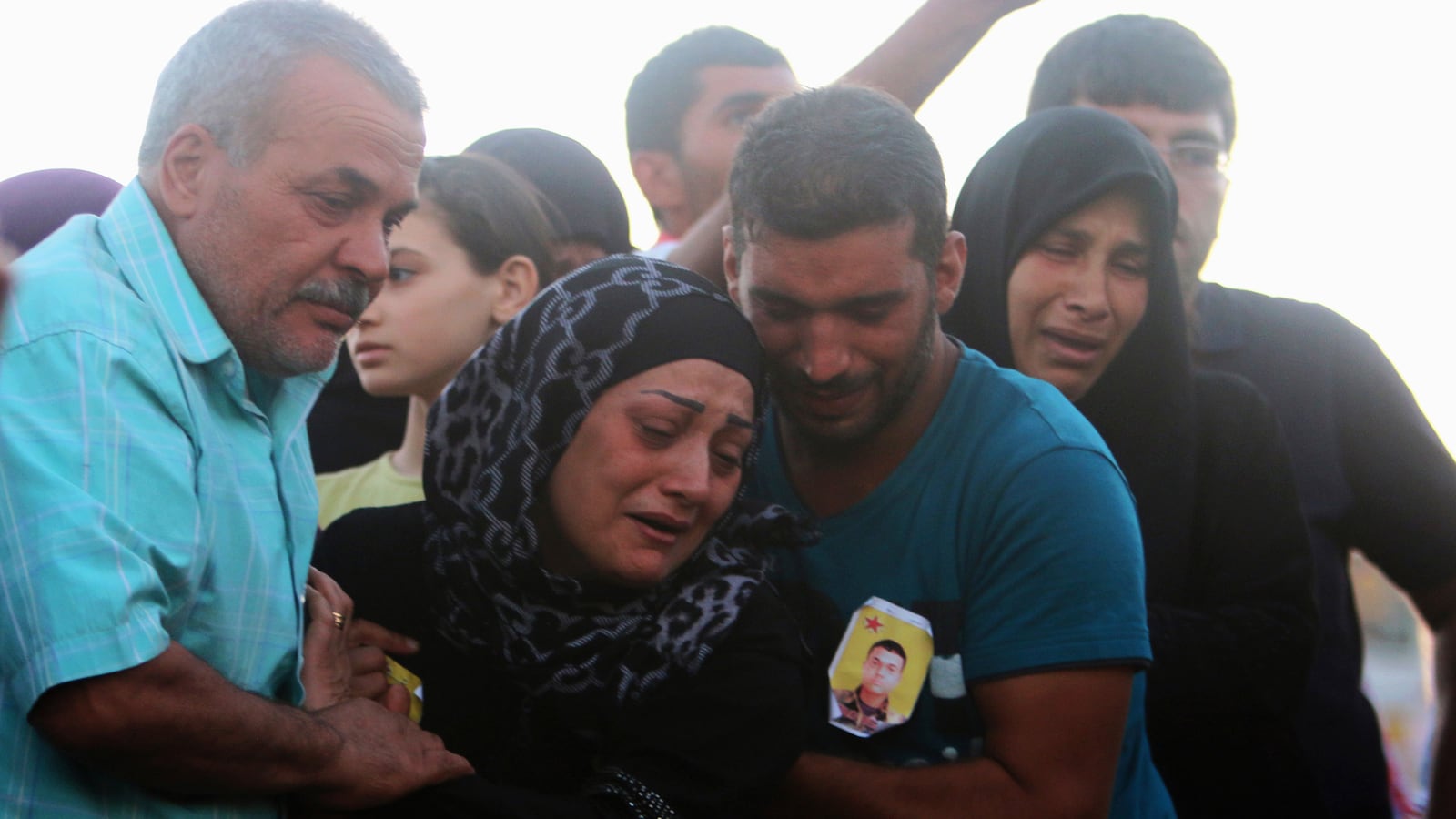Editor's Note: This story has been updated with new information.
One week is as long as the average person can survive without water. In extreme temperatures, it may be less. So time is running out for the 10,000 to 40,000 Iraqis, mostly religious minorities, who have been trapped for days in barren mountains without food or water. They face a choice: return to their towns captured by ISIS forces and risk being slaughtered or stay in the mountains and slowly die of thirst.
On Thursday, the White House signaled that U.S. might reverse its current policy by getting directly involved in Iraq to halt the worsening crisis. So far, the American forces stationed nearby have been little more than observers to the conflict.
According to the New York Times, President Obama is considering authorizing emregency airdrops of food and water for the thousands of Iraqis still stranded in the mountains. Additionally, according to the Times' source, the President could approve airstrikes against ISIS forces that are surrounding the Sinjar mountains.
The slow-motion massacre of the Yazidis, members of a small, ancient religious community who escaped to the mountains along with other groups after ISIS overran their towns, began with a military defeat for the Kurds, one of the closest U.S. allies in the region. The Kurds’ losses, and the subsequent plight of the Yazidis, call into question what role, if any, America is willing to play in Iraq.
Since the disintegration of the Iraqi army in June, the Kurdish military, called the Peshmerga, has been engaged in continuous battle, holding back ISIS’s advances. Until recently the Kurds seemed to be faring well, even expanding their territory. But ISIS has grown stronger even while fighting on multiple fronts across two countries, gaining new recruits and weapons from its victories.
Sometime in the night on August 2, ISIS began its assault on the town of Sinjar, the historical home of the Yazidis that had served as a refuge for other groups, including Christians, Shabak, and Shia. Outgunned and outmanned by ISIS, the Peshmerga say they ran out of ammunition and abandoned the town on August 3. Left unprotected, the Yazidis and others fled into the hills.
Last month, the U.S. sent more than 800 special operations troops to Iraq, including a contingent now stationed in Erbil, within the Kurdish autonomous region. But so far, even as the Kurds have requested assistance repeatedly and launched a new counteroffensive, the United States has been reluctant to move past its advisory role and directly enter the fray.
On Wednesday, Cmdr. Elissa Smith, a U.S. Defense Department spokeswoman, told The Daily Beast: “U.S. troops are not engaged in a combat role in Iraq.” That position could be changing now as the president meets with his security advisors to weigh his options. Currently the military forces in Iraq are acting as “advisors” whose mission is “to assess and to advise [Iraqi security forces] as they confront [ISIS] and the complex security situation on the ground.” What kind of advice is being provided to the embattled Kurdish forces and whether advice is what they need right now are a matter of speculation.
U.S. attention, of course, is stretched thin with Gaza and Ukraine. But the near silence on Iraq is hard to square with the severity of the crisis and the initial decision to send military forces there.
If the American public and political class won’t bear any U.S. military involvement in Iraq, why were troops dispatched to the country? And if ISIS overrunning the Kurds, taking control of key infrastructure, and carrying out a deliberate slaughter of the Yazidis isn’t enough to get the U.S. forces involved, is there anything that would force a U.S. military response?
The situation is dire, but legal constraints may limit U.S. options for direct assistance to the Kurds, said Douglas Ollivant, a former U.S. Army officer who advised Gen. David Petraeus and served in the National Security Council under Presidents George W. Bush and Barack Obama.
“There might not be a legal way for us to sell arms to the KRG [Kurdistan Regional Government],” Ollivant said. “The Kurds are finding out the hard way that there are huge structural barriers, totally independent of policy, being a sub-state unit.”
Though the Kurds have their own government and operate in a functionally autonomous region of northern Iraq, they still belong to the Iraqi state and are nominally accountable to the government in Baghdad. They have long advocated for full independence and the creation of their own sovereign state, but the U.S. has refused to back those efforts.
To get arms legally to the Kurds now, the U.S. military needs to send them through the central government in Baghdad.
“Foreign Military Sales and Foreign Military Financing must be coordinated with central government authorities,” said Cmdr. Smith, the Defense Department spokeswoman.
The Iraqi government traditionally has been hostile to the Kurds and their calls for independence, and a month ago, military cooperation between the two sides might have seemed impossible. But now, with ISIS advancing, Baghdad may be feeling enough pressure to approve an arms transfer.
On Monday, the Iraqi government announced a strategic alliance between the two groups. Baghdad pledged that it would cooperate militarily with the Kurds and send its air force to assist the Peshmerga in the fighting around Mosul.
And in an op-ed published Tuesday in The Washington Post, former U.S. ambassador to Iraq Zalmay Khalilzad wrote that the United States is involved in “the direct supply of munitions to the Kurds and, with Baghdad’s agreement, the shipment of some Foreign Military Sales (FMS) program weapons to the Kurds.”
There are other opportunities for U.S. assistance that are more direct but also more fraught. “We could we get involved with drone strikes or air strikes” that would involve “little to no risk” for the U.S. military, said Ollivant, who added that the air strikes could be used to target “strategic targets like ISIS’s rear bases and logistical hubs.”
“We are not conducting air strikes in Iraq,” Cmdr. Smith said on Wednesday. By Thursday afternon that policy could change at any moment, as the White House is expected to announce what new action the U.S. will take in Iraq "imminently" according to the New York Times report.
While U.S. airpower isn’t directly involved yet, Khalilzad wrote Tuesday that the U.S. military is “coordinating Iraqi air attacks against Islamic State targets relevant to the defense of the Kurdish region.”
Whatever degree of American assistance the Kurds are receiving, they have already begun a counteroffensive. Thousands of Kurdish forces from Syria and Turkey have crossed the border, forming a rare alliance with the Peshmerga inside Iraq that has already begun clashing with ISIS to recapture the ground lost over the weekend.
Tens of thousands of Iraqis now stranded in the mountains are awaiting the outcome of those battles. As for the United States, it is “working urgently and directly with officials in Baghdad and Erbil to coordinate Iraqi airdrops to people in need,” the Defense Department said.
On Wednesday, it was 106 degrees in Mosul. There may be 25,000 children trapped in the mountains, according to the United Nations’ children’s relief agency. Forty of them have died already.
On Thursday, United Nations spokespeople and Kurdish government sources reported that rescue operations had begun for the people trapped in the Sinjar mountains. There is no confirmation yet of who is leading those efforts or how many people have been evacuated, but according to Christopher Tidey, a UNICEF official in Geneva, most displaced families are still on the mountain.





